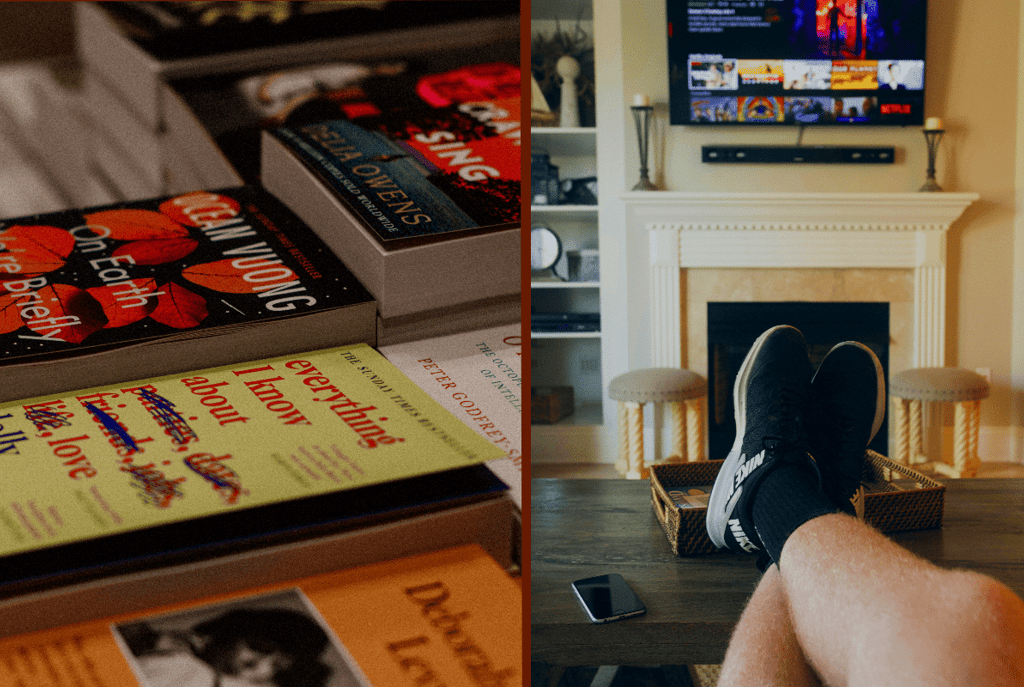Books vs. TV: Which Is Better for Your Brain?
9/17/2024


In a world where entertainment options are endless, the debate between books and TV is ever-present. While both offer great ways to relax and escape, which one is better for your brain? Let’s dive into the pros and cons of each medium and explore how they affect your mental well-being, creativity, and cognitive skills.
1. How Books Benefit Your Brain


Books have been a favorite pastime for centuries, and their benefits are well-documented. Here's how reading impacts your brain:
a. Improves Focus and Concentration
When you read a book, you engage in sustained attention for long periods. Unlike the fast-paced nature of TV, reading requires focus, enhancing your ability to concentrate on tasks in daily life.
Pro Tip: Try reading for 20-30 minutes each day to boost your attention span.
b. Stimulates Imagination
Books allow your mind to visualize characters, settings, and plot twists, fostering creativity and imagination. With no visuals provided, your brain does the heavy lifting, painting pictures based solely on the words you read.
Fun Fact: Studies show that reading fiction helps improve empathy, as you experience emotions and scenarios through the eyes of characters.
c. Enhances Vocabulary and Knowledge
Every book you read expands your vocabulary and knowledge base. Whether it’s learning new words or gaining insight into different cultures and perspectives, books are a gateway to lifelong learning.
Pro Tip: Keep a notebook or app handy to jot down new words or interesting facts you come across in your reading.
d. Boosts Cognitive Function
Books, especially complex ones, challenge your brain. This mental workout enhances cognitive functions like problem-solving, critical thinking, and memory retention. Regular reading is also linked to a lower risk of cognitive decline as you get older.
2. How TV Affects Your Brain


TV is often labeled as “mindless,” but is it really? While it's more passive than reading, television can still offer certain mental benefits, depending on how it's consumed.
a. Visual and Auditory Stimulation
TV engages both sight and sound, providing multisensory experiences that can be entertaining and educational. Some programs, such as documentaries or educational shows, offer knowledge in a more digestible format than books.
Quick Insight: TV shows with strong narratives, like dramas or mysteries, also require some level of cognitive engagement as viewers follow plot lines and character development.
b. Stress Relief
There’s no denying that sometimes we just want to sit back, relax, and escape from the real world. TV can provide a much-needed mental break, helping to reduce stress and promote relaxation—especially after a long day.
Pro Tip: Make sure to balance relaxing TV time with more mentally stimulating activities, like reading or puzzles.
c. Limits Imagination
However, TV often hands you the visuals and interpretations on a silver platter, leaving less room for your imagination to roam. Unlike books, where you actively create the world in your head, TV does the creative thinking for you, which can reduce the mental effort needed.
3. Books vs. TV: Cognitive Impact
While both books and TV engage the brain, they do so in different ways. Here's how each medium stacks up cognitively:
a. Books Encourage Active Engagement
Reading requires active mental engagement, as your brain processes words, sentences, and larger narrative structures. You must focus to comprehend and retain information, which strengthens neural connections and improves cognitive abilities.
b. TV Promotes Passive Consumption
TV, on the other hand, is generally more passive. While some genres (like documentaries or mystery shows) can stimulate thinking, much of the content is designed for passive consumption, which doesn’t engage the brain in the same way reading does.
Fun Fact: Research shows that excessive TV watching can have a negative effect on your attention span and overall cognitive function, especially when it replaces activities like reading or exercise.
c. Balance Is Key
Ultimately, balance is key. While reading provides more cognitive benefits, TV can still offer mental stimulation and relaxation when consumed mindfully. Incorporating a healthy mix of both can keep your brain engaged and healthy in different ways.
4. Social and Emotional Impact
Books and TV can also have different social and emotional effects, depending on how they're used.
a. Books: Building Empathy
Books, especially fiction, allow readers to step into the shoes of characters from all walks of life. This builds emotional intelligence and empathy, as readers experience the world from diverse perspectives.
Quick Insight: Readers of fiction often score higher in tests of empathy than non-readers, as stories help them connect with other people’s emotions.
b. TV: Promoting Social Interaction
While reading is often a solitary activity, TV can promote social interaction, especially when watching shows with family or friends. Whether it's discussing plot twists or laughing at a shared favorite show, TV can strengthen social bonds.
5. Which Is Better for Your Brain?
The answer depends on how you engage with each medium. Reading undeniably offers more cognitive benefits, from boosting focus and imagination to improving critical thinking. However, TV isn’t all bad. When used in moderation and paired with intellectually stimulating content, TV can also contribute to learning and stress relief.
Conclusion:
Both books and TV have a place in your entertainment and learning toolkit. For brain-boosting benefits, reading is the clear winner, but TV can offer its own unique advantages when consumed wisely.
By balancing both in your life, you can enjoy a richer, more engaging experience that stimulates your mind while also giving you space to relax.


